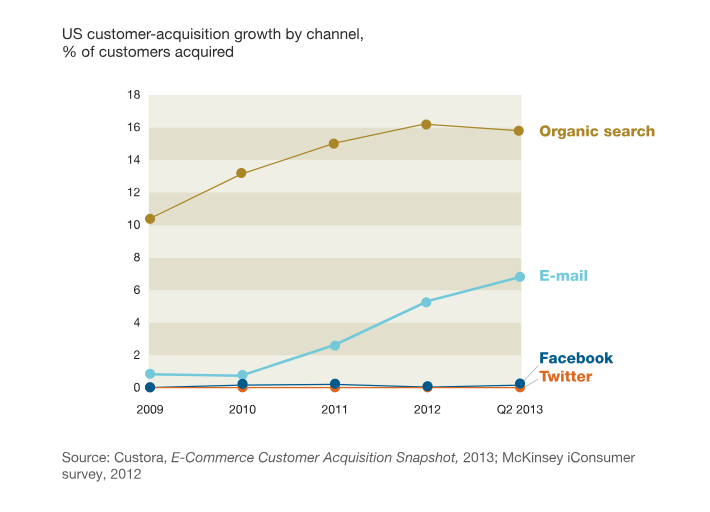Email Is More Important Than Social Channels
While it can be tempting to throw in your all with every shiny new social media platform that comes along, the stability and longevity of these platforms is notoriously unreliable, making a solid email marketing strategy with a good website to back it up the better way to go.
___________________________
Guest post by Jeremy Young of Soundfly's Flypaper
We just launched a new online course with Bandzoogle called How to Create a Killer Musician Website, and made it free. Part of the reason we made it free is because, to us, having a website to serve as a home base for all your musical things is necessary, and this is essential knowledge for any musician, despite many people’s proclamations that websites are dead.
Here’s the thing. As instructor Delaney Gibson says in this video, “Social media comes and goes, and who knows if Instagram is going to be here tomorrow.” By that she means: If you run your musical projects like a business, you don’t want to put all your stock in the new, shiny platform that comes along every few years. Those companies notoriously teeter on the edge of complete disaster and mismanagement more than we’d like to acknowledge. You want to make sure you’re in control of your brand as much as is in your power.
So what does all this have to do with emails? Well, your website and email list go hand in hand, mission-wise. Your website introduces you to your fans and lets them fall in love with you; your email list gives you a way to stay in touch after they’ve fallen in love, with no middlemen. For that reason, an email marketing strategy remains a core component of most marketing strategies adopted by independent artists today.
But why?
Why not just use social media to create conversations with fans (you should do that, too!), or let word of mouth do the work for you (hard to control, but yeah, absolutely!)? Let’s touch on some of the reasons people in business swear by email marketing, and why this crosses over well into music.
Oh yeah, and check out the course, too. Did we mention it’s free?
1. Email is “permission marketing” at its best.
“Permission marketing” is a term invented by marketing guru Seth Godin in opposition to the standard ways that most businesses market products by competing for people’s attention. Think of TV ads, or terrible websites with flashing ads all over them, or billboards on the side of the highway. (I mean, I still can’t believe we allow companies to try to capture our attention WHILE DRIVING, but don’t even get me started on that.)
Permission marketing, on the other hand, is the idea that customers are giving you their blessing to communicate with them. They’re saying, in essence, “Yes, I want to hear about whatever it is you’re offering,” which makes it more like a friendly conversation than someone shouting at you from the other room.
2. Email sees more engagement.
In part because of this “opt-in” element, email marketing also tends to see the most engagement of all your marketing channels. Another reason is that email is still the most dominant form of communication online and where people spend most of their time, as this handy article from OptinMonster points out.
One McKinsey study from 2012 says that email marketing is 40 times more effective than Facebook and Twitter combined at converting customers. And while email has become slightly less useful since then, as our inboxes have started to overflow, it still outperforms social media at measures of engagement pretty much across the board.
3. Email allows you to “own” your community.
OK, you don’t actually own anyone. But there’s a reason it’s important to “own” info about your fans. Here’s an easy story that describes why.
When we were starting Soundfly, we created a Facebook page to share new courses with our audience. Lots of people started liking our page. The problem was, Facebook wouldn’t allow our posts to reach these people without spending money on boosts and ads! These are people who said they wanted to hear from us, but Facebook controls whether they see what we post, presumably as a way to drive us to spend money. And if they tweak their algorithm, we might suddenly never reach anyone who’s followed us ever again!
They have total control. Other social media platforms are similar.
With email, you don’t have these problems. You can communicate with your email list however you want, whenever you want, with no middlemen. You might use a service like MailChimp or Constant Contact to send your emails, but you can export your list from that service at any time. You can also segment your list by interests, reach out to individuals directly, or switch to a new service, and keep the same community intact.
Your fans have trusted you with their email addresses, and you control what you do with that responsibility.
There are heaps of other reasons why email is an essential part of your marketing strategy, from cost (free!) to messaging (unfiltered!) to integration with different strategies (easy!), but we don’t need to belabor the point. The big idea is that your email list is probably going to be a critical part of your website strategy, and it’s worth thinking about it from the outset. If you sign up for the course, we go into some ways to use your email list effectively later on.
Jeremy Young is a music business guru and loves giving advice to young, emerging bands on how to make their tours more effective. He also plays guitar, publishes audiobooks, runs a record label, and is an artist working in sound media. He has performed and released material throughout Europe, Asia, the US, UK and Canada, mostly with his trio Sontag Shogun.
